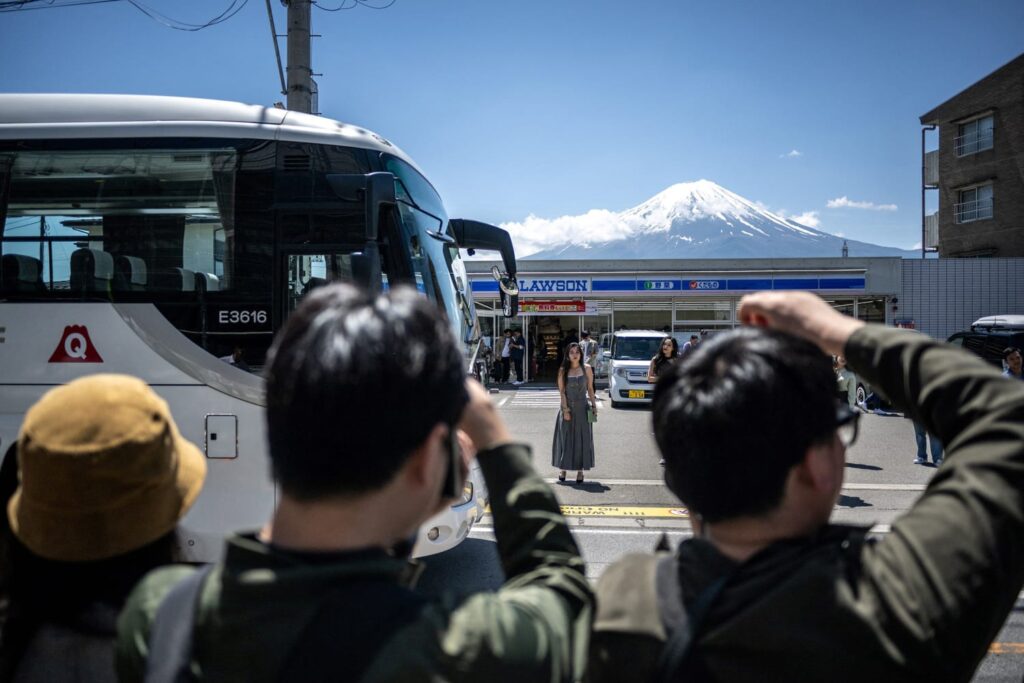May 1, 2024, 2:53 a.m. EDT / Source: Associated Press
From the Associated Press
FUJIKAWAGUCHIKO, Japan — The town of Fujikawaguchiko is tired of tourists.
The town, known for having numerous photo spots that offer near-perfect shots of Japan’s iconic Mount Fuji, began erecting large black screens on some of its sidewalks on Tuesday to block views of the mountain because of misbehaving foreign tourists.
“Kawaguchiko is a town that depends on tourism, and I welcome many tourists, and the town also welcomes them, but we are concerned about their manners,” says Michie Motomochi, owner of a cafe serving the Japanese sweet “ohagi” near the soon-to-be-closed photo spot.
Motomochi cited littering, crossing busy roads, ignoring traffic lights and trespassing on private property. But she’s not complaining: 80% of her clients are foreign tourists, and their numbers have soared after the pandemic hiatus that saw Japan shut down for about two years.
Town officials say her area suddenly became popular about two years ago, after a photo taken at a particular angle that made it appear as if Mount Fuji was standing on top of a local convenience store went viral on social media, and the store became known as “Mt. Fuji Lawson.”
Officials say the small area has become congested ever since, with mostly foreign tourists, and residents have voiced concerns and complaints about visitors blocking narrow sidewalks, taking photos on busy roads and encroaching on neighbouring properties.
In Europe, concerns about tourist overcrowding in historic cities led the city of Venice last week to launch a test program to charge day-trippers a 5-euro ($5.35) entrance fee, which officials hope will curb visits at peak times and make the city more livable for its dwindling population.
The town of Fujikawaguchiko has tried other tactics, such as putting up signs in English, Chinese, Thai and Korean urging tourists to stay out of the road and to use designated crossings, and hiring security guards to control the crowds, but none of it has worked.
The barrier was erected after residents complained about a surge in foreign tourists. Philip Fong/AFP – Getty Images
Officials say the black netting, when completed in mid-May, will be more than eight feet high and more than 65 feet long and will almost completely block views of Mount Fuji.
Cloudy skies on Tuesday made Mount Fuji invisible, but dozens of tourists gathered to take photos.
Anthony Hock from France thinks the screens are an overreaction. “Even if tourists are causing a problem, the subject is too big and the solution is too big. It doesn’t seem right to me,” he said. The 26-year-old suggested that road barricades be installed for safety, rather than blocking the view for photo ops.
Recommendation
But Helen Pull, a 34-year-old tourist from the UK, was sympathetic to local concerns, saying that during her travels in Japan over the past few weeks she had seen “from what we’ve seen, there’s a real increase in tourism here in Japan”.
“I can understand why people who live and work here would want to do something about it,” she said, noting that many people were taking photos even though they couldn’t see the mountain. “That’s the power of social media.”
Since entry restrictions were lifted, foreign tourists have been flocking to Japan, partly due to the weak yen.
Tourists take photos of Mount Fuji at Lake Kawaguchiko on Friday. Philipp Fong/AFP – Getty Images
More than 25 million tourists visited Japan last year, according to the Japan National Tourism Organization, and this year they are expected to surpass 2019’s record of about 32 million — and the government wants to see an uptick in visitors.
The tourism boom is helping the economy but has sparked complaints from residents of popular destinations such as Kyoto and Kamakura, where a famous geisha district recently decided to close off several alleys on private property.
Locals aren’t sure what to do.
Motomochi said he could not imagine how the black screens could help control the flow of people on the narrow sidewalk or the road next to it.
Yoshihiko Ogawa, who runs a rice store in the Fujikawaguchiko area that has been in business for more than half a century, said the congestion has worsened in recent months, with tourists gathering and talking loudly from around 4 or 5 a.m. He said he sometimes has trouble getting his car in and out of the garage.
“I never thought we’d be faced with a situation like this,” Ogawa said, adding that he didn’t know what the solution was. “I think everyone just has to get used to it.”


